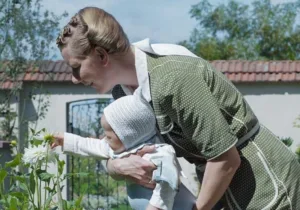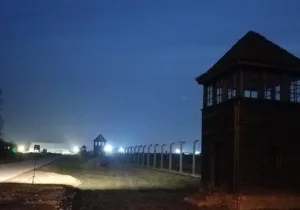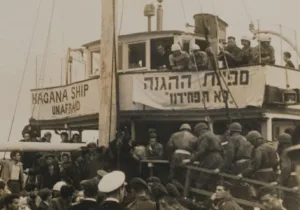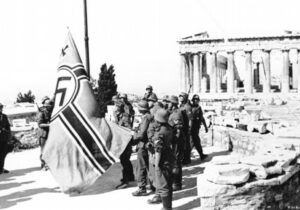You may have seen the popular YouTube video. It shows a 1988 British show “That’s Life,” in which an aging Nicholas Winton is suddenly confronted by an audience of scores who stand when the host asks who among them had been saved as children from the Nazis by Winton in 1939. Winton rescued 669 children, mostly Jewish, from Czechoslovakia before and after the Nazi occupation. The families they left behind were mostly exterminated.
Anthony Hopkins masterfully portrays Winton in the inspirational new film One Life. At the Washington, DC showing I attended, a 99-year-old survivor appreciatively spoke after the film, holding up the dress and blanket she had on the train at age 14 when rescued, incarnating Winton’s accomplishment 85 years later.
As a 29 year old London stockbroker, Winton visited Prague in 1938 to help the British Committee for Refugees from Czechoslovakia. In 1937, after Kristallnacht, Britain approved a program to welcome refugee children to Britain if they had sponsors and were backed by the equivalent of $5000 today. The program had been advocated by Jewish and Quaker groups, among others. Until Britain declared war on Germany in 1939, about 10,000 children were saved in the “kindertransport.” As the film portrays, Winton was staggered by the plight of refugees in met in Czechoslovakia and resolved to rescue as many children as possible, despite the massive challenge of finding sponsors and enormous sums of money in a short period.
Through publicity, and with help from his London-based mother, herself originally a German Jew (Winton was baptized into the Church of England), Winton secured homes and funds for 669 children who departed Prague in 8 trains. Those trains had to cross Nazi Germany and Holland, which after Kristallnacht blocked Jewish refugees, making exceptions for the British-backed trains. The final train was to depart on the day Germany invaded Poland, igniting World War II. Of the 250 children on that train that could not leave, only two children survived the war. The children he failed to save always haunted Winton.
After a successful life in business and charity, Winton’s heroism was unnoticed until he looked to safeguard his scrapbook about saving the children. He met Holocaust historian Elizabeth Maxwell, herself Czech, and the wife of British media mogul Robert Maxwell, who publicized his story, leading to his momentous 1988 appearance on television, around which the film is based. Winton thereafter enjoyed friendships with many of the survivors and their own families. Descendants of the saved children may number 7000.
The film does not examine the complexities behind Britain’s kindertransport. But obviously thousands of children, many of them toddlers, were traumatized by abruptly leaving their parents and forced to live with strangers. Some older male children, upon becoming adults, were detained in Britain as enemy aliens. Many never learned the fate of their parents left behind under the Nazis. Some older children, as adults, would serve with the Allied armed forces during the war. Surely almost all, despite their grief, were grateful to have been rescued from mass murder.
Why were the refugee children separated from their parents instead of brought to Britain as intact families? Allied nations were resistant to large numbers of refugees despite Nazi horrors. Accepting children, as Britain and France tried to appease Nazi Germany, was more politically palatable than accepting whole families. According to this chart, out of over a half million German Jews when the Nazis took power in 1933, 65,000 escaped to Britain, while 140,000 escaped to America. Others escaped to Latin America, British Palestine, and China. Six million European Jews perished in the Holocaust. Many more could have been saved but faced restrictions that were bureaucratic, short-sighted, and often fueled by prejudice or moral indifference.
One Life focuses on the good news of 669 children who were saved, thanks to Winton and several others. It’s appropriate that Helena Bonham Carter portrays Winton’s mother because her Spanish grandfather, Eduardo Propper de Callejon, as a diplomat in France, defying his own government under Franco, for which he professionally suffered, saved hundreds of Jews by signing Spanish visas. Amid the world’s multitude of evils, there are always heroes.
The 99-year-old survivor who spoke after the showing of One Life that I attended recalled that at the Prague train station her mother had considered retaining her youngest daughter before placing her on the train with her two other daughters. They never saw their mother again. But their mother had saved their lives. All three daughters would live to know and thank Winton as adults. Two sat behind him in 1988 on the British program “That’s Life.”
In the film, Winton’s mother, played by Carter, tells a difficult British bureaucrat that her family had come to Britain because it was a nation of decency and fair play. Whatever its failures, Britain did try to live up to its reputation by saving Jewish and other children, along with other refugees. So did America, although it also could have done more. Both nations would have to war against and destroy the Nazi regime. Pray there are always free countries that retain some decency and offer refuge to the persecuted. And may God always protect the persecuted and the countries that give them asylum.







 Sponsor a student for Christianity & National Security 2024
Sponsor a student for Christianity & National Security 2024